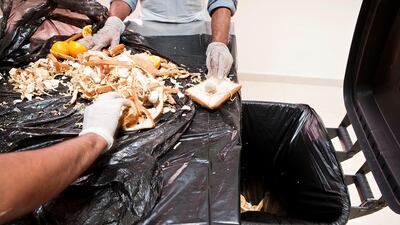Efforts to curb food waste seem to be paying off in Abu Dhabi after the emirate’s waste management authority revealed that it collected thousands of tonnes less waste during Ramadan and Eid Al Fitr this year compared to last.
Tadweer has been raising awareness of the environmental and economic impact of waste in recent years and it said on Sunday that the amount of household waste during the Holy Month decreased by a quarter compared to last year.
The amount of household waste collected during Ramadan 2017 reached 53,347 tonnes and during Eid it was 8,915.
That’s a big improvement on last year when about 74,000 tonnes of waste were collected during Ramadan and Eid together.
The Ministry of Climate Change and Environment announced a few months ago that it is currently working with the Food and Agriculture Organisation of the United Nations to develop a comprehensive food diversification policy framework for the UAE.
“Through this partnership, we aim to address the whole food value chain to ensure long-term food security of the country, both imported and domestically produced food, as well as consumption and disposal of food, in which prevention and reduction of food waste is a critical element,” said the Minister of Climate Change and Agriculture, Dr Thani Ahmed Al Zeyoudi.
“We need to work together to find creative ways to address food waste, particularly during the Holy Month of Ramadan, when we often see an increase in food waste. Much of this will have to come from changing our behaviour.”
However, much more needs to be done to raise awareness on food waste in general.
“Campaigns need to be ongoing, from the consumer to the regulator level to NGOs and the media - they all need to come together to tackle this issue,” said Habiba Al Marashi, the chairwoman of Emirates Environmental Group.
“The results of Tadweer’s campaign - if accurate - can be used as a motivational platform as there will always be work to be done to improve.”
Stuart Fleming, founder of EnviroServe UAE, said that “awareness about recycling is prevalent, people understand and know that it is the right thing to do”.
However, trust needs to be built between recycling companies, government bodies and residents to ensure that the cycle is continuous.
The only way to stop people from throwing their rubbish in the bin is “through social media - companies need to show people that recycling is on the cards”.
“It’s a show and tell rather than just tell - there needs to be an increase in education campaigns to convey the message of social responsibility,” added Mr Fleming.


